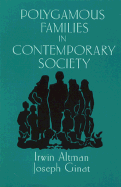Book contents
- Frontmatter
- Contents
- Foreword
- Preface and acknowledgments
- 1 Introduction
- Historical background
- Early stages of relationships
- Home environments of plural families
- Managing everyday life
- 13 The rotation process: Husbands and wives alone together
- 14 Budget and resource management
- 15 Celebrations and holidays
- Social-emotional and family relationships
- Appendix A Methodology and procedure
- Appendix B Demographics of Mormon polygyny
- Notes
- References
- Index
14 - Budget and resource management
Published online by Cambridge University Press: 05 May 2010
- Frontmatter
- Contents
- Foreword
- Preface and acknowledgments
- 1 Introduction
- Historical background
- Early stages of relationships
- Home environments of plural families
- Managing everyday life
- 13 The rotation process: Husbands and wives alone together
- 14 Budget and resource management
- 15 Celebrations and holidays
- Social-emotional and family relationships
- Appendix A Methodology and procedure
- Appendix B Demographics of Mormon polygyny
- Notes
- References
- Index
Summary
All cultures – whether monogamous or polygamous, technological or agricultural, poor or wealthy or engaged in farming, animal husbandry, manufacturing, or information processing – generate, allocate, and distribute resources in the form of goods, products, and some type of currency. Ethnographies of world cultures illustrate that family life and family structure are inseparably linked to resource issues. The fundamental economic unit in many traditional societies is the family, with husbands, wives, and children generating resources. In polygynous cultures, plural wives and numbers of children serve as a crucial labor pool for the economic well-being of the family.
Budget and resource management is of utmost concern to contemporary Mormon plural families, for the challenges they face are numerous. Many fundamentalist families are in lower or middle-class socioeconomic groups (see appendix B). Although some participants in our sample are college educated and have their own businesses or are in professional fields, many have a high school education and work in skilled, semiskilled, or unskilled occupations such as carpentry, construction, truck driving, farming, office work, housecleaning, and sales. Thus few modern plural families are prosperous or wealthy. Many families struggle to stay afloat economically because they do not always have steady work or the financial resources to fall back on in difficult times. Moreover, plural families often have multiple households and numerous children. To make ends meet, many wives in present-day plural families work on a regular or intermittent basis (as do wives in monogamous families).
- Type
- Chapter
- Information
- Polygamous Families in Contemporary Society , pp. 302 - 317Publisher: Cambridge University PressPrint publication year: 1996



